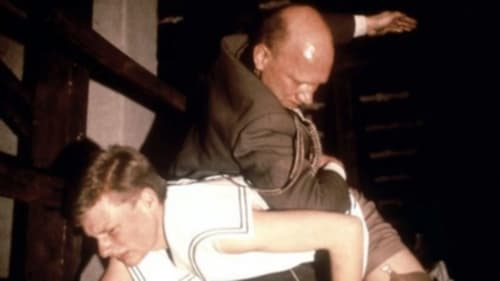
Editor
Rex Gildo’s songs and musicals made him very popular. His best-known song was “Fiesta Mexicana” from 1972. Rosa von Praunheim tells the story of his life in the context of the gay pride movement, the normative pressures of the Schlager music industry, and the profound changes currently underway.

Editor
In this docudrama Rosa von Praunheim looks into Johann Wolfgang von Goethe’s sexual orientation, especially into his erotic experiences during his travels in Italy. Contrary to the common belief, von Praunheim argues that Goethe was not a heartbreaker and conqueror after all. It was only in Italy, that he had diverse sexual experiences, not least with men. Von Praunheim bases his assumption on letters written by Goethe to his friend Friedrich Heinrich Jacobi about these sexual encounters. Some of the content of these letters is re-encated in the film. At the same time, historians and linguists analyse and classify the letters into their historical context.

Editor
About Stefan Stricker, who calls himself Juwelia and has been running a gallery on Sanderstraße in Berlin Neukölln for many years. Every weekend he invites guests to shamelessly recount from his life and to sing poetic songs written with his friend from Hollywood Jose Promis. Juwelia has been poor and sexy all her life, has always struggled for recognition, but only partially.

Editor
Bosom buddies BeV StroganoV, Ovo Maltine, Ichgola Androgyn and Tima die Göttliche are four Berlin drag queens who met in the mid 1980s. These four queens became Germany’s most popular drag performers and have been busy fertilizing the German cultural scene. Besides being performers, they are also political activists – in AIDS awareness, anti-gay violence, the sex workers movement and the struggle against the extreme right and racism. The film tells their story.

Editor
Filme sobre o famoso sexólogo Dr. Magnus Hirschfeld, um judeu gay e socialista que em 1897, fundou o primeiro grupo político gay da história. Também em Berlim, abriu seu Instituto de Ciências Sexuais, em 1920, que se mantém único e foi altamente comentado pelo mundo. Hirschfeld morreu no exílio na França, em 1935, dois anos depois de ter todo o trabalho de sua vida destruído pelos nazistas. O filme revela a personalidade e as experiências de Hirschfeld por meio das principais figuras da sua vida; do amor impossível pelo Barão von Teschenberg aos anos felizes que passou com o jovem Karl Giese; da luta com o principal oponente à causa gay, o escritor de direita Adolf Beand, ao apoio de seu anjo-da-guarda, o travesti Dorchen, uma figura de grande inteligência e coragem. "O Einstein do Sexo" foi o nome dado a Hirschfeld pelos jornais americanos, em 1931. Perguntado a respeito da comparação, ele respondeu; "Acho muito bom, mas o melhor seria chamar Einstein de Hirschfeld da Física".

Sound
The life story of Charlotte von Mahlsdorf, who survived the Nazi reign as a trans woman and helped start the German gay liberation movement. Documentary with some dramatized scenes. Two actors play the young and middle aged Charlotte and she plays herself in the later years.

Editor
The life story of Charlotte von Mahlsdorf, who survived the Nazi reign as a trans woman and helped start the German gay liberation movement. Documentary with some dramatized scenes. Two actors play the young and middle aged Charlotte and she plays herself in the later years.

Original Music Composer
The life story of Charlotte von Mahlsdorf, who survived the Nazi reign as a trans woman and helped start the German gay liberation movement. Documentary with some dramatized scenes. Two actors play the young and middle aged Charlotte and she plays herself in the later years.

Editor
Although too long by half, this documentary is subtitled "A Trip Through Lotti's Life" and that is essentially what it is. Although done in a style that keeps you guessing what is true and what isn't about her life -- everything from her Aryan lover and her stay in a concentration camp while he is killed for their forbidden love -- it is a fascinating look at this remarkable woman through the eyes and viewfinder of Rosa Von Prauheim.

Editor
AIDS victims and activists cope with hardship and society’s ignorance.

Editor
This film powerfully documents New York City's gay community's response to the AIDS crisis as they are forced to organize themselves after the government's failure to stem the epidemic. Activists who are interviewed include playwrite Larry Kramer, People With AIDS Coalition co-founder Michael Callen (who died of AIDS in 1994), New York filmmaker and journalist Phil Zwickler, as well as representatives from ACT-UP, Queer Nation and the Gay Men's Health Crisis.

Editor
In modern-day Berlin (1987), Frau Kutowski goes insane, believing herself to be the (real-life) notorious Anita Berber, a nude art dancer/drug addict/scandalous figure of post-WWI Berlin. (Berber died of tuberculosis in 1928, having achieved significant success and recognition throughout the dance world.) Frau Kutowski is placed in a mental hospital, where in her own mind she acts out Berber's final days, including in her fantasies the hospital's staff and patients, to represent Anita's friends and associates.

Editor
A Film by Rosa von Praunheim Nurses on the night shift roll dice to see which AIDS patient will die next. The owner of a gay bathhouse gets Kaposi's Sarcoma but tries to keep his mind on profits. An epidemic victim is harassed by a reporter on his death bed - he sticks her with a contaminated syringe. The government opens a quarantine called Hell Gay Land. Gay terrorists kidnap the Minister of Health. A black comedy filled with everybody's worst fears, A Virus Knows No Morals is Rosa von Praunheim's most controversial film to date: a savagely funny burlesque on the AIDS crisis. Irreverent yet deadly serious, the filmmaker covers just about every aspect of AIDS and its effects, as well as the rumors surrounding it. Since the 1960's von Praunheim has produced a provocative body of underground films, making him one of the New German Cinema's most original artists. "Brave and Vicious – Armed Camp!"

Turned while visiting New York, down-on-her-luck Neue Deutsche Welle vampire Sylvana struggles to get by in 1980s West Berlin when she realizes none of her friends want to be bitten.

Editor
A documentary about "Death" magazine, founded by "Screw" Magazine founder and publisher Al Goldstein, and its eventual failure.

Assistant Editor
Personal diary-style documentary of German Gay rights activist Von Praunheim's sojourn in the US.

Sound Editor
Tally Brown, New York is a 1979 documentary film directed, written and produced by Rosa von Praunheim. The film is about the singing and acting career of Tally Brown, a classically trained opera and blues singer who was a star of underground films in New York City and a denizen of its underworld in the late 1960s. In this documentary, Praunheim relies on extensive interviews with Brown, as she recounts her collaboration with Andy Warhol, Taylor Mead and others, as well as her friendships with Holly Woodlawn, and Divine. Brown opens the film with a cover of David Bowie’s “Heroes” and concludes with “Rock ’n’ Roll Suicide.” The film captures not only Tally Brown’s career but also a particular New York milieu in the 1970s.

Assistant Director
Tally Brown, New York is a 1979 documentary film directed, written and produced by Rosa von Praunheim. The film is about the singing and acting career of Tally Brown, a classically trained opera and blues singer who was a star of underground films in New York City and a denizen of its underworld in the late 1960s. In this documentary, Praunheim relies on extensive interviews with Brown, as she recounts her collaboration with Andy Warhol, Taylor Mead and others, as well as her friendships with Holly Woodlawn, and Divine. Brown opens the film with a cover of David Bowie’s “Heroes” and concludes with “Rock ’n’ Roll Suicide.” The film captures not only Tally Brown’s career but also a particular New York milieu in the 1970s.

Editor
Tally Brown, New York is a 1979 documentary film directed, written and produced by Rosa von Praunheim. The film is about the singing and acting career of Tally Brown, a classically trained opera and blues singer who was a star of underground films in New York City and a denizen of its underworld in the late 1960s. In this documentary, Praunheim relies on extensive interviews with Brown, as she recounts her collaboration with Andy Warhol, Taylor Mead and others, as well as her friendships with Holly Woodlawn, and Divine. Brown opens the film with a cover of David Bowie’s “Heroes” and concludes with “Rock ’n’ Roll Suicide.” The film captures not only Tally Brown’s career but also a particular New York milieu in the 1970s.

















